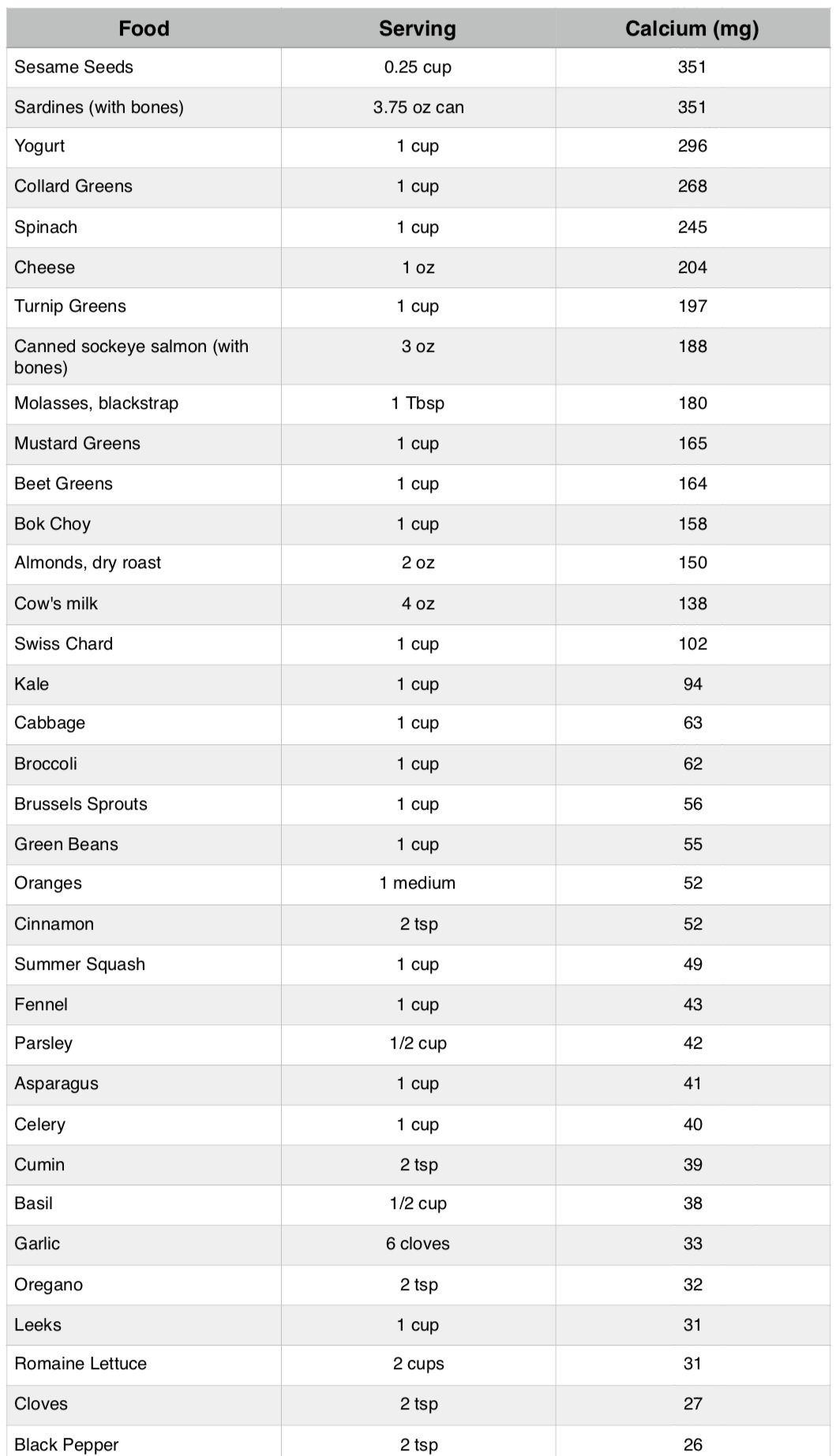Contrary to popular belief you don’t need to supplement with calcium to have strong bones and prevent osteoporosis. You can get all of your daily calcium needs through food. There are many foods high in calcium if you eat a nutrient dense whole food diet.
In the last article, we discussed that calcium supplementation does not increase bone density and does not decrease the risk of fractures. In fact, calcium supplementation may even increase the risk of hip fractures. Taking calcium supplements can also increase the risk of heart disease, stroke, kidney stones, and potentially shoulder pain (calcific tendonitis).
So can we get enough calcium from our diets alone? The answer is yes, if you eat a nutrient dense whole food diet. In saying this, you may need to supplement with vitamin D, vitamin K2, and magnesium. There are other factors that affect calcium levels as well. More on this in another article.
Recommended Daily Intake of Calcium and Absorbing Calcium
The recommended daily intake for calcium is 1,000 mg to 2,000 mg/day. However, your daily levels could be bumped down to about 800 mg/day if your vitamin D and vitamin K2 levels are good. Vitamin K2 and vitamin D are required so you can absorb calcium from foods and also for controlling calcium levels. Furthermore, protein increases the absorption of calcium. So having protein with each meal will help you absorb calcium.
Foods High in Calcium
Many foods that are staples in the North American diet are “fortified” with supplemental calcium. Cereals, bread, juices, and instant oatmeal are common foods people eat that have supplemental calcium added to them. Even almond milk you buy has fortified calcium. Multivitamins also have supplemental calcium in them. You should be aware of this so you don’t go overboard on supplemental calcium.
The following table shows the calcium content in whole foods starting with the best sources:
You might be surprised to see there are foods higher in calcium content than dairy. It’s a popular belief that you need to have dairy products in order to keep your bones and teeth strong. Not true. If you ate a can of wild sockeye salmon, had a couple of cups of leafy greens, and had 2 ounces of almonds you would be around 800 mg.
By the way, there’s nothing wrong with consuming dairy. It’s highly nutritious. If you can tolerate dairy have at it. Plain yogurt, for example, is high up on the calcium content but also serves as a good fermented food source. Fermented foods like yogurt, kefir, raw sauerkraut, and kimchi are really good to consume to attain and sustain good gut health.
Other important vitamins and minerals for strong bones
Calcium isn’t the only important nutrient that help keep your bones strong. In the next article, I will talk about other nutrients important to keep your bones healthy such as vitamin K2, vitamin D, and magnesium. There are also other important factors like exercise, stress, and sleep that will have an effect on your bone health.
Conclusion
In conclusion, debunking the myth that calcium supplementation is necessary for strong bones and osteoporosis prevention reveals the pivotal role of a nutrient-dense whole food diet. Contrary to popular belief, achieving adequate calcium levels solely through dietary sources is not only feasible but also beneficial. However, it’s crucial to acknowledge the nuanced interplay of factors such as vitamin D, vitamin K2, magnesium, and protein absorption in optimizing calcium utilization. While recognizing the importance of calcium-rich foods beyond dairy, it’s essential to balance nutritional intake and avoid excessive reliance on fortified products. Embracing a holistic approach to bone health entails not only understanding the significance of various nutrients but also acknowledging the impact of lifestyle factors like exercise, stress management, and quality sleep. As we continue exploring the multifaceted nature of bone health in forthcoming discussions, let’s empower ourselves with knowledge to foster comprehensive well-being and resilience in our skeletal system.
For a healthy spine and nervous system, contact Edmonton chiropractor Dr. Dean Collins. Or book a consult and exam with him today.
To learn more about how chiropractor care can help you and your family, read Dr. Collins’ comprehensive guide to chiropractic care: Chiropractic Care for Everyone.
Sign up for our Dr. Collins’ newsletters and blog posts
Sign up Dr. Collins’ newsletters to receive vital information on how to keep your spine and nervous system healthy as well as how to help optimize your health and avoid chronic illness.




Thanks for this very useful info. Is it possible to have a printable version of the list above to have handy in my kitchen.
Hi Margaret,
I will see if I can change the image to a PDF. I will email you it in PDF format as well.
Hi again Margaret,
I emailed you a PDF. However, you could click on the image as well and a new window will open. You can print it that way as well.
Dr. Collins
Interesting reading. Linda